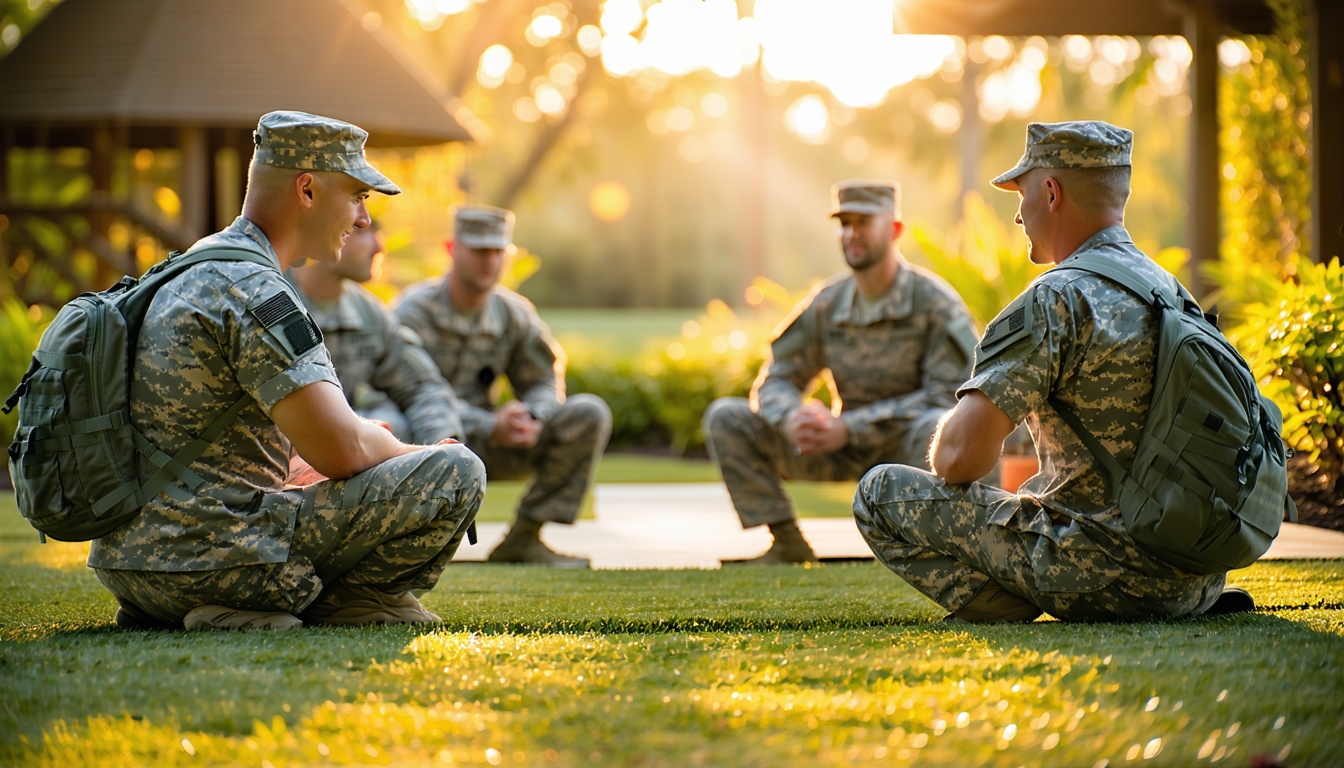Rehab for veterans can be a life-changing experience, especially if you or someone you love is struggling with substance use and the emotional weight of transitioning back to civilian life. As a veteran, you may face unique challenges that stem from duty-related trauma, disrupted family dynamics, or difficulties readjusting to daily routines. When these challenges blend with the stresses of addiction, seeking professional help can transform your life in profound ways. At Kemah Palms, we recognize and honor the complexities you encounter and strive to deliver evidence-based, industry-leading drug and alcohol addiction treatment tailored specifically to your circumstances. In this comprehensive guide, you will see how a supportive environment, specialized therapies, and consistent aftercare make all the difference in your recovery journey.
Recognize the challenges veterans face
Military service can profoundly shape your worldview and coping mechanisms. While your training equips you to handle high-pressure scenarios, readjusting to civilian life often requires an entirely different skill set. Adapting to life outside the structured confines of service can lead to stress, anxiety, and unresolved trauma. According to the Substance Abuse and Mental Health Services Administration (SAMHSA), around 44% to 72% of veterans experience heightened stress levels when transitioning back to civilian life [1]. This stress can exacerbate existing mental health issues or contribute to substance use.
One of the most commonly cited difficulties is post-traumatic stress disorder (PTSD). Research suggests that between 7.7% and 17% of veterans develop PTSD at some point [2]. PTSD can manifest in flashbacks, nightmares, and hypervigilance, and it often correlates with substance abuse, as individuals may try to self-medicate in the face of overwhelming emotions. Feelings of guilt, shame, or sadness can also complicate this cycle, making it hard to break free without support.
Beyond PTSD, the reintegration process can strain personal and family relationships. Veterans may have trouble expressing vulnerabilities or processing the emotional toll of service. The sense of camaraderie often found in a military unit can be missing in civilian life, creating an emotional void. Loneliness and isolation may ensue, further triggering self-destructive habits. Recognizing these difficulties is the first and most crucial step toward choosing an intervention strategy.
At Kemah Palms, we believe that acknowledging the depth of the challenges veterans face is essential to building a meaningful recovery plan. We address substance use and co-occurring mental health issues in a structured, supportive environment that fosters understanding, acceptance, and the potential for growth. By recognizing these hurdles, you position yourself to receive the right care, which is critical for your healing and well-being.
Explore customized treatment at Kemah Palms
Every veteran enters recovery with a distinct set of experiences and clinical needs. For you or your loved one, a one-size-fits-all program often fails to capture the nuances of military trauma, stress, or family dynamics. That is why Kemah Palms focuses on creating tailored treatment programs that combine evidence-based therapies, individual support, and practical coping strategies.
Holistic and multi-layered approach
To ensure comprehensive care, we integrate multiple layers of healing. For example, our dual diagnosis treatment center is designed to treat both a substance use disorder and co-occurring mental health issues like PTSD, depression, or anxiety. This approach ensures that you do not have to juggle different treatment providers with conflicting priorities. Instead, all conditions are addressed simultaneously, allowing for deeper and more lasting progress.
In some cases, you might benefit from a medically assisted detox or a more intensive level of care that prioritizes your comfort and safety during withdrawal. Our clinical staff monitors and adjusts treatment based on your symptoms, ensuring you feel supported rather than overwhelmed.
Adapting to your stage of recovery
No single treatment track works for everyone, and some veterans prefer a less-structured environment for their recovery. Our intensive outpatient treatment program might be ideal if you have pressing family or work commitments. It allows you to receive focused therapy sessions during the day while returning home each evening. If you need greater consistency or more time away from triggers, an inpatient rehab center offers 24-hour professional care in a secure, healing environment.
Moreover, you can opt for specialized modalities suited to your background and emotional needs, such as a faith based rehab center for individuals who want spiritual components integrated into their treatment. If spirituality is not your pathway, you can explore holistic therapies like mindfulness exercises or our holistic rehab program. Everything we do is geared toward ensuring you experience a continuum of care that respects the personal nature of your journey.
Building trust and rapport
You might feel hesitant to open up, especially given a military culture that often encourages self-reliance. At Kemah Palms, we train our staff to navigate these sensitivities gently. Therapists here understand military values and recognize the importance of building trust through empathy and consistency. They strive to create a safe, judgment-free zone in which you can express your challenges, address trauma, and rediscover hope for the future.
Learn about essential therapy approaches
An essential element of quality rehab for veterans is access to diverse, proven therapy methods. When you arrive at Kemah Palms, we do a thorough assessment to determine which approaches best suit your needs, ensuring we build an individualized plan to promote lasting recovery.
Cognitive behavioral therapy
Cognitive behavioral therapy (CBT) excels at identifying the underlying thoughts and beliefs that drive substance use. By making you aware of negative thought patterns, CBT empowers you to replace them with healthier alternatives. This method can be especially beneficial if you are experiencing PTSD symptoms, since addressing triggers and reframing harmful thoughts helps you cope in a more balanced way. Consider exploring our approach to cognitive behavioral therapy for addiction if you are seeking a research-backed tool for transformation.
Trauma-focused treatments
For veterans with persistent trauma, specialized trauma therapies can be added to your plan. You may benefit from trauma therapy for addiction, which addresses how past experiences continue to influence present behaviors. Whether through Prolonged Exposure, Eye Movement Desensitization and Reprocessing (EMDR), or other trauma-focused techniques, our goal is to help you process traumatic memories and reduce their hold on your daily life.
Group and family therapy
The value of peer support should not be underestimated. Many veterans find solace in group sessions where participants share experiences, gain mutual support, and develop a pragmatic sense of camaraderie. Group therapy dissolves feelings of isolation and emphasizes the collective strength found in recovery communities.
Additionally, family therapy addiction sessions foster healing for both you and your loved ones. Open communication, guided by a trained facilitator, helps de-escalate conflict, strengthens relationships, and sets the stage for a stable home environment. Engaging family members can boost your accountability and help them better understand the complexities of your circumstances.
Leverage VA resources and support
While a private treatment facility like Kemah Palms often serves as a crucial anchor for recovery, leveraging the network of resources offered by the Department of Veterans Affairs (VA) can further strengthen your foundation for healing. You may be eligible for vocational training, financial assistance, and specialized mental health services.
Vocational training and employment readiness
Engaging in meaningful work can expedite your sense of independence and self-worth. Programs through Veteran Readiness and Employment (VR&E) provide job training, resume workshops, and support for educational pursuits if you are reskilling or reentering the workforce. These resources can ease the difficulty of adjusting to civilian employment and help you secure long-term stability [3].
Several VR&E services also aid employers in accommodating veterans with service-connected disabilities. Salary subsidies and assistive technologies can help foster a more welcoming environment in which you can thrive. Combined with addiction treatment, these opportunities can reduce stressors related to financial or career uncertainty.
PTSD-specific programs
If you are dealing with PTSD, the VA offers a variety of specialty clinics and programs featuring evidence-based therapies like Cognitive Processing Therapy, Prolonged Exposure therapy, or EMDR. Many Vet Centers, which are community-based counseling offices, provide free, confidential services. Linking these services with treatment at Kemah Palms can boost your efforts to overcome trauma. It is all about creating synergy between tried-and-true VA solutions and our own tailored options for addiction recovery.
Housing and social support
Some veterans face challenges like unstable housing upon reentry to civilian life. The VA, in collaboration with various community organizations, maintains outreach programs that link homeless or at-risk veterans to transitional housing, mental health counseling, and job placements. Resources like the National Veterans Homeless Support (NVHS) focus on mitigating homelessness by connecting veterans with stable living options and supportive care [4]. Whether you need immediate housing solutions or just a little extra support to stay on the right track, these services can significantly enhance your rehabilitation experience.
Embrace your family’s role in recovery
For many veterans, family plays a central role in both the formation and unraveling of mental health and addiction challenges. Strengthening these structures through a supportive environment can help you escape the cycle of isolation and shame.
Building open communication
If you have been through frequent deployments, you may have missed key family milestones or built up emotional walls as a defense mechanism. Opening lines of communication is crucial to establishing trust. By regularly sharing updates about your experiences in rehab, you lighten your emotional burden and help your family feel more invested in your healing.
Joint sessions through family therapy addiction provide a safe space to air grievances, confront misunderstandings, and practice positive reinforcement techniques. Your therapists guide both you and your loved ones, allowing you to develop stronger communication methods that also serve you well in day-to-day life.
Reducing relapse triggers
Family members frequently act as first-line monitors for relapse risks. If your loved ones understand triggers related to PTSD, stress, or specific emotional struggles, they can help you maintain accountability. Involvement in your treatment plan also encourages them to practice empathy and patience while you refine coping skills.
At Kemah Palms, we encourage a family-centered approach because your home environment can be the key to preventing relapse. A stable, nurturing household significantly boosts your chances of sustaining a sober lifestyle, and your entire family can benefit from improved relationships.
Understand how to plan for aftercare
Completing a formal rehab for veterans does not mark the end of your recovery journey, but rather an important transition point. Aftercare strategies offer the support necessary for lasting recovery, bridging the gap between structured treatment and a return to independent living.
Post-treatment programs at Kemah Palms
We believe in personalized aftercare. Whether you graduate from our residential program or an outpatient track, we recommend continuing therapy, support group attendance, or vocational assistance relevant to your personal goals. Our aftercare planning services customize a schedule of follow-up sessions, routine check-ins, and community resources so that you stay engaged with your progress.
Some veterans maintain a part-time presence in therapy to ensure they keep refining new skills. Others transition into a sober living program that offers a curated environment for practicing self-reliance while still enjoying group support. This continuity fosters emotional resilience and minimizes the risk of setbacks.
Flexible care alternatives
If you have commitments that keep you from attending daily therapy, consider an option like our partial hospitalization program php. This arrangement provides a high level of clinical support during the day, allowing you to return home in the evenings. Alternatively, you can opt for intensive outpatient treatment if you desire consistent contact with your therapy team, but with the freedom to manage personal duties. By creating pathways that balance structure with autonomy, aftercare ensures you can keep life’s stressors at bay without feeling overwhelmed.
Relapse prevention
Relapse prevention is an integral part of aftercare. You learn to anticipate triggers, develop new responses to emotional or situational stress, and rehearse coping strategies in a supervised setting. We also encourage you to identify early warning signs of relapse, enabling swift intervention. Ongoing peer support, either in-person or through virtual meetups, can reinforce your commitment to sobriety. You might also find community in veteran-specific groups, which provide an additional shared understanding of military experiences and how they intersect with addiction.
Choose our specialized rehab for veterans
Selecting the right facility can be one of the most important decisions of your life. At Kemah Palms, you will find industry-leading drug and alcohol addiction treatment designed to meet the unique challenges veterans face. Our commitment to individualized plans means that every therapy, wellness activity, and educational session reflects your specific mental health status and personal background.
Expert therapists and clinically proven methods
Our therapeutic staff includes psychologists, psychiatrists, counselors, and peer support specialists trained in techniques that consistently yield measurable results. By focusing on proven interventions like CBT, mindfulness-based relapse prevention, and group therapy, we deliver the support necessary for lasting recovery. Additionally, you can find specialized programs for opioid addiction, alcohol abuse, or other substances.
Veteran-friendly environment
We foster an empathetic culture where discussions about military experiences and reintegration stressors feel natural. Open dialogue about PTSD or other service-related trauma is encouraged, not stigmatized. This environment helps you develop healthy coping strategies free from judgment.
In addition to talk therapy, you have the option to explore beneficial adjunctive treatments. Some veterans prefer rehab with yoga, as the focus on breathing and gentle movements offers a sense of grounding. Others might find solace in a rehab with art therapy, which taps into creativity for emotional release. Whatever your preference, our dedicated staff is here to help you explore various forms of self-expression, so you can rediscover your purpose and passion.
Integrated community support
Transitioning from active duty to civilian life does not have to mean a loss of community. Our alumni program keeps you connected to the facility and your peers long after you have completed your initial treatment. Regular check-ins, community events, and online forums help ensure that you do not face uncertainty alone. Essentially, we strive to replicate the sense of unity you felt in your military unit, but in a recovery context that promotes accountability, growth, and hope.
When you choose Kemah Palms, you opt for compassionate, specialized care that acknowledges every facet of your experience as a veteran. Our methods rely on proven techniques, advanced clinical knowledge, and a firm commitment to helping you reclaim the life you deserve.
Frequently asked questions
-
How long does rehabilitation for veterans typically last?
The duration can vary based on factors like the severity of your addiction, co-occurring disorders, and personal progress. Many veterans spend about 30 to 90 days in an initial program, but some need extended care. At Kemah Palms, you can move to less-intensive solutions, such as outpatient care or structured aftercare services, when you are ready. -
Do VA benefits cover the cost of rehab for veterans?
You may be eligible for some level of financial assistance through the VA, depending on the specifics of your service and your benefits package. The VA also offers vocational training and mental health services that complement private rehab. We suggest contacting a VA representative to discuss your eligibility or contacting our admissions team for guidance on available options. -
Is family therapy a recommended part of the healing process?
Yes. Family therapy often benefits veterans by addressing breakdowns in communication, trust, and emotional support. A family’s involvement can motivate you to remain consistent in your recovery goals and help them understand the intricacies of your journey. We offer family therapy addiction sessions tailored to your unique family unit. -
What if I have both PTSD and a substance use disorder?
When you experience two or more conditions simultaneously, it is known as a co-occurring disorder. Kemah Palms offers integrated treatment in our dual diagnosis treatment center, where you can receive therapies for PTSD and substance use at the same time. This approach helps ensure that each condition is addressed fully, preventing one issue from sabotaging progress in the other. -
How do I get started with a treatment plan at Kemah Palms?
You can contact our admissions team for a confidential consultation. During this call, we will gather information about your background, current challenges, and clinical needs. We will discuss payment or insurance options and coordinate with any VA services you might be using. By the end of our initial assessment, you will have a clearer understanding of the specialized treatment plan designed for you.
Recovery should not be an isolating, overwhelming process. With the right blend of compassionate care, evidence-based therapy, and ongoing support, you can rediscover a sense of purpose and belonging. At Kemah Palms, we stand ready to help you or your loved one break free from addiction and reclaim a healthier, more fulfilling life. By choosing a program that addresses both your military background and substance use challenges, you give yourself the greatest chance at lasting transformation. Reach out today and start building the foundation for your successful journey toward wellness.







